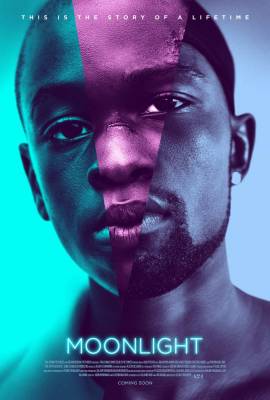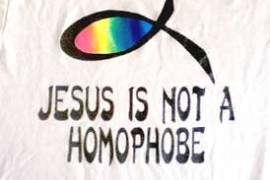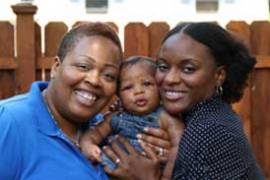
21 Black Queer Films To Watch This Black History Month
Blog Search
As we observe Black History Month this February, it’s important to pay homage to the ways that films have helped change hearts and minds by shattering harmful stereotypes and educating others of the pressing issues that we face. Complex and nuanced media representation have also helped validate the everyday lives and struggles of Black queer people.
While, we definitely need more films that show the complexity, the beauty and the diversity of our community, there is an existing robust canon of Black queer films that we can get lost in, learn more about our history and inspire the next generation of filmmakers and thought leaders.
Here are 21 of those film to save in your queue now:
The Aggressives (dir. Eric Daniel Peddle, 2005): This indie doc follows a series of lesbian "butches" and "studs" in New York City who are navigating how they self-identify, their gender expression and their dreams. Peddle spends five years following the doc's subjects, including trans masculine actor Marquise Vilson.
Bessie (dir. Dee Rees, 2015): Pariah director Dee Rees captures the life of iconic blues singer Bessie Smith (Queen Latifah). The biopic centers on the intersections of childhood trauma, race, gender, bisexuality and how the Tennessee native broke barriers and rose to fame in the 1920s and 1930s.
Brother to Brother (dir. Rodney Evans, 2004): Perry (Anthony Mackie), a young art student, finds himself at crossroads when his family kicks him out for being gay. He befriends an elderly homeless writer whose stories about his times with Harlem Renaissance icons Langston Hughes and Zora Neale Hurston somehow bring him strength and inspiration. By juxtaposing the past and the present, director Rodney Evans beautifully conveys how universal Black queer struggle spans the generations.
Brother Outsider: The Life of Bayard Rustin (dir. Nancy Kate, Bennett Singer, 2003): This stunning documentary tells the story of Bayard Rustin, one of the most vital architects of the Civil Rights Movement and the March on Washington, but who never received the credit or the limelight he deserved because he was gay. The film travels from his childhood in Pennsylvania to his life in Harlem to later becoming Dr. Martin Luther King's advisor.
The Color Purple (dir. Steven Spielberg, 1985): Based on Alice Walker's beloved novel, the film follows Celie (Whoopi Goldberg) and her journey through trauma, sexual abuse, and violence to find joy, purpose and independence eventually. While the queer relationship between Celie and Shug is watered down compared to its source material, this Oscar-nominated film is still one of the first mainstream feature films to depict romantic love between two Black women.
Gun Hill Road (dir. Rashaad Ernesto Green, 2011): Set in the Bronx, an Afro-Latinx trans teen Vanessa (Harmony Santana) finds herself transitioning when her transphobic father (Esai Morales) comes home from prison. Santana, the first openly transgender actress nominated for an Independent Spirit Award, shines in this coming-of-age story about living one's truth out loud.
Holiday Heart (dir. Robert Townsend, 2000): This sweet made-for-television movie follows a gay drag queen named Holiday Heart (Ving Rhames), who finds himself alone after the death of his police officer boyfriend. He later befriends and takes in Wanda (Alfre Woodard) and her young daughter and steps in to raise the girl when her mother struggles with drug addiction.
I Am Not Your Negro (dir. Raoul Peck, 2016): Drawing its inspiration from Baldwin's unfinished manuscript, Remember This House, the Oscar-nominated doc is a powerful fusion of Baldwin's words (read by Samuel L. Jackson), archived footage, and messages on how anti-Blackness has been deeply embedded into the fabric of America.
Kiki (dir. Sara Jordenö, 2017): This vibrant and emotional documentary picks up where Paris Is Burning leaves off. Shifting its gaze on a new generation of LGBTQI+ youth in the ballroom scene, Kiki proves that while it might "get better" for some, the most marginalized and vulnerable still need a safe haven to help them find community, love, and validation.
The Death and Life of Marsha P. Johnson (dir. David France, 2017): France's second documentary juggles two main goals: To pay homage to iconic trans activist Marsha P. Johnson's life and to examine her suspicious 1992 death. Using modern-day interviews, archived videos, and highlighting her friendship with fellow trans activist Sylvia Rivera, the film illuminates her lasting legacy and how her bravery influenced the LGBTQI+ movement we see today.
Looking for Langston (dir. Isaac Julien, 1989): This visually stunning experimental film explores Black and white gay identities set in the Harlem Renaissance. Inspired by the life and work of poet Langston Hughes, Julien infuses poetry from Hughes, Bruce Nugent and Essex Hemphill with multiple genres of music to convey the expression and suppression of gay desire during that era.
Mississippi Damned (dir. Tina Mabry, 2009): Based on Mabry's own life, her debut feature follows the lives of three young Black children doing their best to navigate their worlds as they suffer from suffocating cycles of internalized homophobia, child sexual abuse, addiction and poverty. This heartbreaking film, which stars Tessa Thompson, will haunt you way after the credits roll.
Moonlight (dir. Barry Jenkins, 2016): Divided into three stanzas— childhood, adolescence, and adulthood—Chiron navigates his identity and sexuality while experiencing the intersections of poverty, familial instability, addiction, violence and same-gender love. Based on Tarell Alvin McCraney's play, "In Moonlight Black Boys Look Blue," the Oscar-winning film is a devastatingly beautiful portrait of a Black man finding his way in an unforgiving and unflinching world.
Naz and Maalik (dir. Jay Dockendorf, 2015): In this endearing coming-of-age story, two best friends--Black Muslim teens from Bed-Stuy, Brooklyn-fall in love. But coming out isn't easy, especially since they know their devout religious family would disapprove. This isn't the only obstacle looming over their lives—the FBI, who are profiling local Muslims, won't stop harassing them.
Pariah (dir. Dee Rees, 2010): Dee Rees' debut feature--the first Black lesbian film to be distributed in theaters nationwide by a Hollywood studio--centers on Alike (Adepero Oduye). The Brooklyn teen, who just wants to be her authentic self and express herself in her writing, is nursing heartache from her first relationship and crumbling under her devout Christian mother's disapproval. In time, Alike uses the power of the pen to find true freedom.
Paris is Burning (dir. Jennie Livingston, 1990): Paris is Burning ran so Pose could fly. This iconic documentary introduced the mainstream to the underground ballroom scene of New York in the late 80s. Highlighting the Black and Latinx LGBTQI+ community's creativity and fashion sense, the Sundance-winning film also served as a reminder of how ballroom helped people build community and family and provided solace and shelter for the most vulnerable.
Rafiki (dir. Wanuri Kahiu, 2018): This touching Kenyan drama follows two young women, Kena and Ziki, as they navigate their love for one another in a country where being LGBTQI+ is illegal. Rafiki is the first Kenyan film screened at Cannes Film Festival and was initially banned in its own country.
Saturday Church (dir. Damon Cardasis, 2017): Part family drama, part musical, Cardasis' stunning debut centers on Ulysses, a queer teen, grieving his father's death and exploring his gender identity and sexual orientation. After being kicked out by his Aunt, he meets a group of trans women (Michaela Jae, Indya Moore) who introduce him to "Saturday Church, " a ballroom family that serves as a much-needed safety net.
Tangerine (dir. Sean Baker, 2015): This gritty indie film shot on an iPhone follows two sex workers (Kitana Kiki Rodriguez; Mya Taylor) who tear through Hollywood on Christmas Eve to track down her boyfriend and pimp's new cisgender girlfriend. Giving a stunning performance, Taylor became the first openly trans actor to win an Independent Spirit Award, taking home the trophy for Best Supporting Female.
Tongues Untied (dir. Marlon Riggs, 1989): Directed by Emmy winner director Marlon T. Riggs, Tongues Untied blends genres—part experimental, part documentary—to "shatter the nation's brutalizing silence on matters of sexual and racial difference." He does this by brilliantly fusing music, dance, and powerful poetry from beloved writers Essex Hemphill and Joseph Beam.
The Watermelon Woman (dir. Cheryl Dunye, 1996): Duyne's work of autofiction centers on a young Black lesbian filmmaker (also played by Dunye) who searches for the identity of a beautiful Black actress, only credited "The Watermelon Woman" for playing a mammy character in a 1930s movie. As Cheryl becomes obsessed with uncovering the woman's true identity, her own life blows up when she realizes she's in love with her white best friend.




